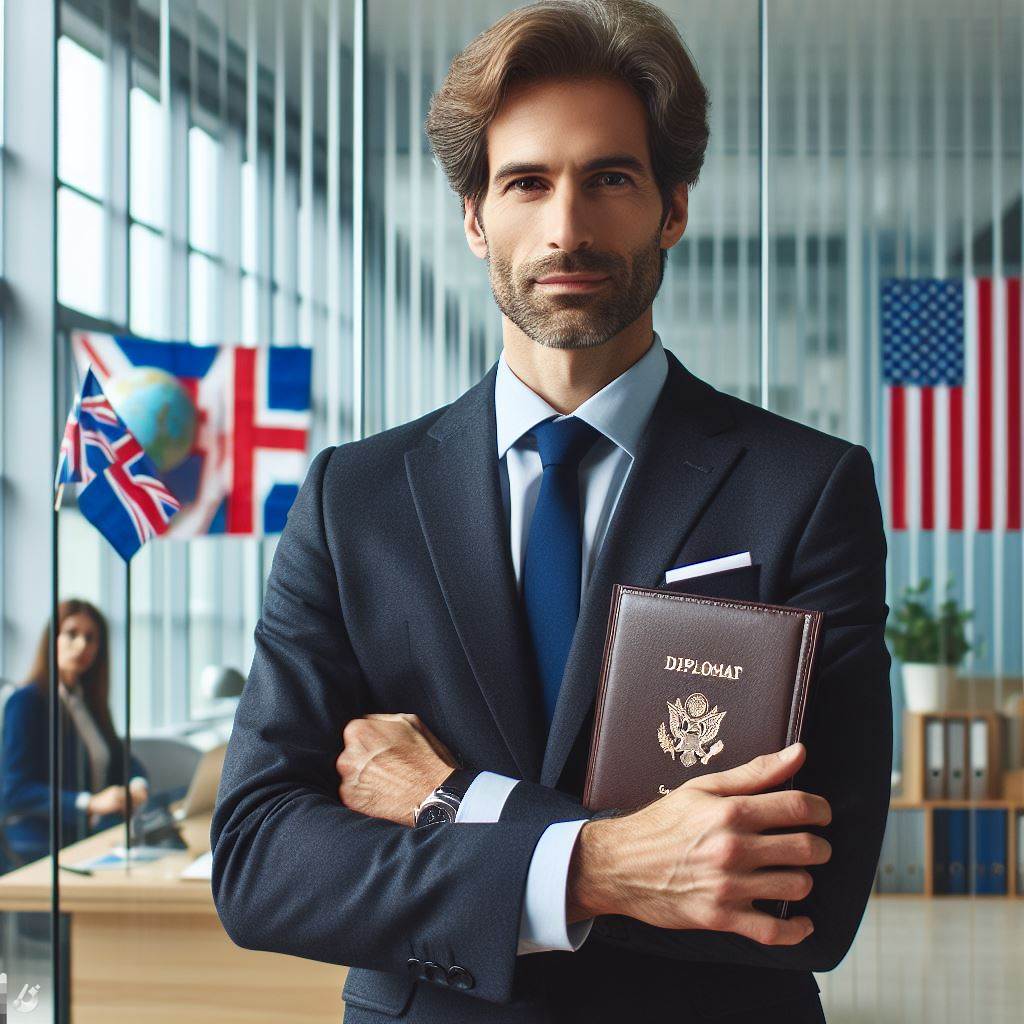Introduction
Brief explanation of the topic
UK politicians play a crucial role in international diplomacy, representing the interests and agenda of the United Kingdom on the global stage.
Their actions and decisions have far-reaching consequences for the country’s relationships with other nations.
Importance of understanding the role of UK politicians in international diplomacy
Understanding the role of UK politicians in international diplomacy is essential as it allows us to comprehend the complexities and dynamics of global politics.
It also sheds light on how the UK influences and is influenced by diplomatic interactions.
Thesis statement: This blog post will explore how UK politicians contribute to international diplomacy and the skills they require for effective diplomacy.
Overview of UK Politicians in International Diplomacy
Explanation of UK politicians’ involvement in international affairs
UK politicians play a crucial role in representing the nation’s interests and promoting diplomacy on the international stage.
They are responsible for negotiating treaties, attending summits, and engaging in diplomatic discussions with leaders from other countries.
Diplomatic relations are essential for maintaining peaceful and cooperative relationships with other nations, and UK politicians are at the forefront of these efforts.
Examples of prominent UK politicians who have played key roles in international diplomacy
- Winston Churchill: Known for his leadership during World War II, Churchill played a significant role in international diplomacy by forming alliances and shaping post-war policies.
- Margaret Thatcher: As the first female UK Prime Minister, Thatcher made a global impact through her firm stance on international affairs, particularly in the Cold War era.
- Tony Blair: Blair actively engaged in international diplomacy, most notably through his involvement in the Iraq War and the Good Friday Agreement in Northern Ireland.
- Teresa May: May navigated complex international negotiations during her tenure as Prime Minister, including Brexit negotiations and maintaining relationships with EU member states.
- Boris Johnson: Currently serving as the Prime Minister, Johnson has been actively involved in shaping the UK’s stance on Brexit and forging new trade relationships with countries around the world.
The Global Impact of UK Politicians: Navigating International Diplomacy
These examples highlight the significant influence that UK politicians have had in international diplomacy.
Their decisions and actions can have far-reaching consequences, shaping global relations and affecting the lives of citizens both at home and abroad.
UK politicians’ involvement in international affairs extends beyond individual leaders.
The UK is a member of various international organizations, such as the United Nations, NATO, and the G7.
UK politicians actively participate in these organizations, representing the country’s interests and contributing to discussions on global issues.
Furthermore, UK politicians often engage in bilateral diplomacy, building relationships with other countries on a one-on-one basis.
This involves diplomatic visits, negotiations, and cultural exchanges aimed at strengthening ties and promoting cooperation.
The UK’s historical significance and global influence give its politicians a unique platform in international diplomacy.
As a former colonial power and a major economy, the UK’s political leaders are often sought after to mediate conflicts, foster peace, and contribute to global development initiatives.
In general, UK politicians play a crucial role in international diplomacy.
Their involvement in global affairs helps shape relations between nations, negotiate treaties, and promote cooperation.
Prominent UK politicians have left lasting impacts on international diplomacy, and their roles are essential in maintaining the UK’s position as a key player on the world stage.
Role of UK politicians in shaping foreign policy
Discussion on how UK politicians influence foreign policy decisions
UK politicians play a crucial role in shaping foreign policy decisions, as they are responsible for representing the interests and values of the country on the global stage.
Through their actions and decisions, they have the power to shape relationships with other nations, promote national security, and advance the economic and political interests of the UK.
Firstly, UK politicians have the authority to make key decisions on international issues.
They have the power to negotiate treaties, engage in international organizations, and determine the UK’s stance on important global matters.
These decisions can have far-reaching consequences for the national interest and can shape the UK’s relationships with other countries.
Secondly, UK politicians actively participate in diplomatic efforts to address global challenges.
They engage in diplomatic dialogues, summits, and negotiations to represent the interests of the UK and find solutions to shared problems.
Their involvement in international diplomacy helps build alliances, promote cooperation, and influence the global agenda.
Additionally, UK politicians use their positions to advocate for British values and priorities on the international stage.
They champion human rights, democracy, and the rule of law, giving the UK a voice in shaping global norms and standards.
Through diplomatic channels and international forums, they can raise awareness about issues that matter to the UK, such as climate change, trade, and security.
Overview of UK government structures and departments responsible for foreign policy
The UK government structures and departments responsible for foreign policy are designed to ensure cohesive decision-making and effective representation on the global stage.
At the top of the hierarchy is the Prime Minister, who plays a central role in determining the UK’s foreign policy direction.
The Prime Minister sets the overall strategic priorities, represents the UK in international forums, and appoints ministers to key foreign policy positions.
The Foreign and Commonwealth Office (FCO), headed by the Foreign Secretary, is the main government department responsible for formulating and implementing foreign policy.
It provides advice to the Prime Minister and coordinates relations with foreign governments, international organizations, and other diplomatic missions.
Other relevant departments play a significant role in shaping foreign policy.
The Ministry of Defence contributes to national security and defense policies, while the Department for International Trade focuses on promoting economic interests and negotiating trade agreements.
The Department for International Development aims to alleviate poverty and support development in other countries, thereby shaping the UK’s approach to international aid and humanitarian assistance.
Examining the role of the Prime Minister, Foreign Secretary, and other relevant positions
The Prime Minister, as the head of government, wields considerable influence over the UK’s foreign policy.
They have the power to prioritize international issues, shape the UK’s diplomatic engagements, and make final decisions on critical matters.
Their leadership sets the tone for the country’s global interactions.
The Foreign Secretary, appointed by the Prime Minister, is the key government official responsible for foreign affairs.
They represent the UK internationally, engage in diplomatic negotiations, and oversee the FCO’s work.
The Foreign Secretary plays a vital role in building relationships, managing international crises, and advancing the UK’s objectives abroad.
In addition to the Prime Minister and the Foreign Secretary, other ministers and officials hold relevant positions that contribute to the country’s foreign policy.
The Minister for International Trade, for example, focuses on promoting exports, attracting investments, and negotiating trade agreements to foster economic growth.
Ministers for various regions and international development also play crucial roles in crafting policies tailored to specific regions or addressing global challenges.
In summary, UK politicians are instrumental in shaping the country’s foreign policy decisions.
Their authority and involvement in international affairs allow them to influence global agendas, promote national interests, and advance UK values.
Through a structured government system and the leadership of the Prime Minister and Foreign Secretary, the UK can engage effectively on the international stage and shape its relationships with other nations.
Read: Salary and Benefits of a UK Diplomat Revealed
Skills required for effective international diplomacy
Achieving success in international diplomacy requires a range of skills and abilities.
Here are four essential skills that UK politicians need to excel in this field:
Strong communication and negotiation skills
Effective communication and negotiation are crucial in international diplomacy.
Politicians must be articulate and skilled in expressing their ideas and positions, while also actively listening to understand the perspectives of others.
Furthermore, they must be adept at finding common ground and reaching mutually beneficial agreements.
Cultural awareness and sensitivity
Cultural awareness and sensitivity are vital in international diplomacy. Politicians must understand and respect the customs, values, and traditions of other nations.
This knowledge helps build trust and fosters positive relationships, facilitating effective negotiations and collaborations across borders.
Ability to build alliances and foster international relationships
Building alliances and nurturing international relationships are critical for successful diplomacy.
Politicians need to establish and maintain diplomatic ties with other countries, creating networks of support and cooperation.
These alliances can strengthen a country’s position, enable the pursuit of common goals, and enhance global influence.
Analytical skills to assess complex geopolitical situations
Political leaders involved in international diplomacy must possess strong analytical skills to navigate complex geopolitical situations.
They need to assess the economic, social, and political dynamics of different regions and anticipate the potential consequences of their actions.
This analytical acumen enables them to make informed decisions and formulate effective diplomatic strategies.
Personalized UK Career Consulting
Receive tailored career guidance designed just for you. Get actionable steps and expert support to boost your career in 1-3 days. Take control of your career now.
Get StartedGenerally, effective international diplomacy requires a combination of strong communication and negotiation skills, cultural awareness and sensitivity, the ability to build alliances and foster relationships, and analytical skills.
These skills empower UK politicians to represent their country’s interests effectively, engage in productive conversations with international counterparts, and contribute to global stability and progress.
Read: Languages and Diplomacy: A UK Diplomat’s Guide

Case studies of UK politicians’ successful diplomatic efforts
Margaret Thatcher’s role in the Cold War negotiations
Margaret Thatcher played a significant role in the historic negotiations that took place during the Cold War.
Thatcher firmly believed in the power of diplomacy and her strong leadership skills allowed her to effectively navigate the complex political landscape of the time.
One of her most notable achievements was her close relationship with US President Ronald Reagan. Together, they formed a strong alliance and worked towards ending the Cold War.
Thatcher’s exceptional diplomatic skills and persistence in maintaining dialogues with Soviet leaders contributed greatly to the eventual thawing of tensions between East and West.
Her unwavering commitment to dialogue and negotiation ultimately led to the signing of several important treaties, such as the INF Treaty in 1987.
Thatcher’s successful diplomatic efforts were instrumental in fostering a sense of trust and cooperation between previously adversarial nations.
Tony Blair’s involvement in the Northern Ireland peace process
Tony Blair’s role in the Northern Ireland peace process is widely acknowledged as a remarkable diplomatic achievement.
Blair recognized the need for a peaceful resolution to the conflict and dedicated himself to facilitating negotiations between the opposing factions.
His ability to empathize and build rapport with leaders from different political backgrounds was crucial in gaining their trust and cooperation.
Blair’s tireless efforts culminated in the signing of the Good Friday Agreement in 1998
Marking a pivotal turning point in the long-standing conflict.
Through his skilled diplomacy, Blair helped create a framework for power-sharing and reconciliation, which has contributed to the relative stability Northern Ireland enjoys today.
Your Dream Job Starts with a Perfect CV
Get a tailored CV and cover letter that captures your unique strengths and stands out in your industry. Let us help you make an unforgettable first impression.
Get StartedHis commitment to peace in Northern Ireland serves as a testament to the effectiveness of diplomacy in resolving deeply rooted conflicts.
Boris Johnson’s leadership during Brexit negotiations
Boris Johnson’s leadership during the Brexit negotiations showcased his diplomatic acumen and ability to navigate complex international dynamics.
Throughout the negotiations, Johnson maintained a strong stance, advocating for the interests of the United Kingdom while also recognizing the need for compromise.
His effective communication skills and persuasive rhetoric played a crucial role in fostering dialogue and consensus among the EU member states.
Johnson’s leadership resulted in the successful negotiation of the Withdrawal Agreement, which paved the way for the UK’s departure from the European Union.
Despite the challenges and opposition faced during the process, Johnson’s diplomatic approach helped secure a deal that balanced the demands of both sides.
His ability to forge relationships and build alliances showcased the importance of effective diplomacy in achieving mutually beneficial outcomes.
Essentially, these case studies highlight the powerful impact of UK politicians’ successful diplomatic efforts.
Leaders like Margaret Thatcher, Tony Blair, and Boris Johnson have demonstrated the significance of strong leadership.
Effective communication, and a commitment to negotiation in achieving diplomatic success.
Their accomplishments serve as inspiration and examples of effective diplomatic strategies in navigating complex international challenges.
Read: Languages and Diplomacy: A UK Diplomat’s Guide
Challenges faced by UK politicians in international diplomacy
In this section, we will delve into the challenges faced by UK politicians in international diplomacy.
Exploring the intricacies of Brexit negotiations, we’ll analyze their global impact, scrutinize public opinion, and address criticism surrounding UK politicians’ diplomatic efforts.
Discussing the complexities of Brexit negotiations and their impact on international relations
One of the most significant challenges for UK politicians in international diplomacy is navigating the complexities of Brexit negotiations.
The decision to leave the European Union has far-reaching repercussions for the UK’s relationships with countries around the world.
Optimize Your LinkedIn for Success
Boost your LinkedIn profile with a professional bio, keyword-rich headline, and strategic recommendations that attract recruiters. Stand out from the crowd and get noticed.
Optimize NowThe process of negotiating the terms of the UK’s withdrawal from the EU, including future trade agreements, is a delicate and intricate task.
UK politicians must consider the interests of various stakeholders, both within the country and among its international partners.
These negotiations require UK politicians to engage in diplomatic efforts to build consensus
Negotiate compromises, and secure favorable terms for the country’s economy, national security, and sovereignty.
However, reaching a satisfactory agreement that satisfies all parties involved is a formidable challenge.
Examining public opinion and domestic political pressures
Another challenge faced by UK politicians in international diplomacy is the influence of public opinion and domestic political pressures.
Managing these factors requires politicians to strike a balance between responding to popular sentiment and making informed decisions in the national interest.
Public opinion plays a significant role in shaping UK politicians’ approach to international diplomacy.
Brexit, in particular, has polarized public opinion, with debates over the benefits and drawbacks of leaving the EU dominating the political discourse.
UK politicians must carefully consider public sentiment when formulating diplomatic strategies and making foreign policy decisions.
They must also navigate domestic political pressures, including the influence of interest groups, party politics, and media scrutiny.
Addressing criticism and controversies surrounding UK politicians’ diplomatic efforts
UK politicians face criticism and controversies surrounding their diplomatic efforts, which can pose significant challenges in international diplomacy.
Criticism may arise from opposition politicians, international partners, or the general public.
One notable controversy surrounding UK politicians’ diplomatic efforts is related to the handling of Brexit negotiations.
Critics argue that the process has been characterized by internal division, lack of clarity, and failure to secure favorable terms for the UK.
UK politicians must address these criticisms and controversies while upholding the country’s reputation and maintaining effective relationships with international partners.
They must strive to communicate their diplomatic efforts transparently, resolve disputes diplomatically, and defend their decisions in the face of scrutiny.
Ultimately, UK politicians face a range of challenges in international diplomacy.
Navigating the complexities of Brexit negotiations, managing public opinion and domestic political pressures.
Addressing criticism and controversies are all vital tasks for UK politicians as they represent the country on the global stage.
Read: UK Civil Service Pension Schemes
Delve into the Subject: Crossing the Aisle: UK Political Defections
Conclusion
Recap of the key points discussed
Throughout this section we have explored the important role of UK politicians in international diplomacy. We have highlighted how their actions and decisions shape the country’s relations with other nations.
Emphasizing the vital role of UK politicians in international diplomacy
UK politicians play a crucial role in representing the country’s interests, negotiating agreements, and maintaining diplomatic relations.
Their ability to effectively communicate and negotiate is vital in achieving favorable outcomes for the UK.
Final thoughts on the significance of effective diplomacy for the UK’s global standing:
Effective diplomacy is crucial for the UK to maintain a strong global standing. It allows the country to establish alliances, resolve conflicts, and promote its values and interests.
Without skilled and knowledgeable politicians leading diplomatic efforts, the UK’s global influence would be severely diminished.
In the end, UK politicians are instrumental in shaping the country’s international relations.
Their role in diplomacy cannot be underestimated, as they are key actors in ensuring the UK’s global standing and influence.
A strategic and effective diplomatic approach is essential for the UK’s success in an increasingly interconnected world.
[E-Book for Sale]
500 Cutting-Edge Tech Startup Ideas for 2024 & 2025: Innovate, Create, Dominate
$19.99 • 500 Tech Startup Ideas • 62 pages
You will get inspired with 500 innovative tech startup ideas for 2024 and 2025, complete with concise descriptions to help you kickstart your entrepreneurial journey in AI, Blockchain, IoT, Fintech, and AR/VR.




